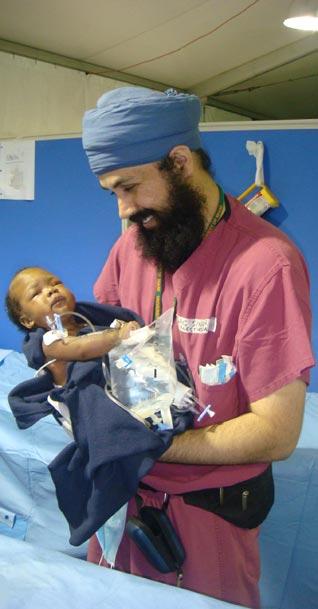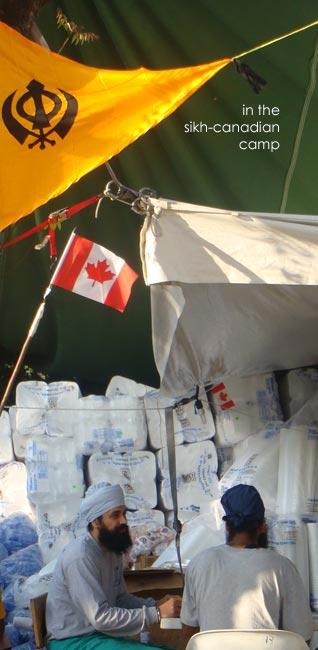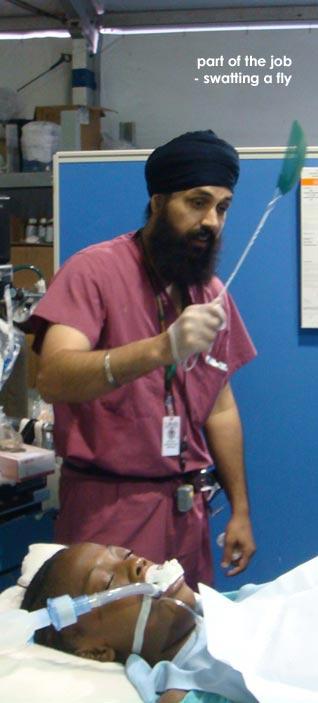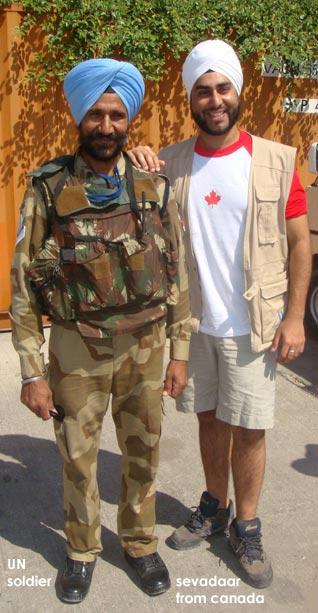Current Events
Haiti: One Year Later
by JAGTAR SINGH HEIR
I squirm as I recall sitting as a hopeful candidate in the Medical School Dean's office and uttering some banal recitation of how I wanted to help people as the eason for wanting to become a physician.
So when this latent desire resurfaced as the news of the devastating earthquake in Haiti filtered in, I tentatively discussed with my wife, a passing thought of "going down there." To my great surprise, everyone was fully supportive of it. However, my hospital, citing concerns of safety and poor logistics, was at first somewhat reluctant to let me go. Nevertheless, after some perseverance, and cutting through the bureaucratic red tape, I was allowed to go as long as I would be serving in a medical capacity.
Immediately upon my arrival in Haiti, I realized that I had no concept of the magnitude of the devastation that had taken place in this impoverished nation. In fact, things were so much worse than I had imagined and it didn't escape me that I was arriving nearly three weeks after the earthquake had already taken place.
It is my belief, that natural disasters are somewhat arbitrary; as massive earthquakes and category IV hurricanes could and have devastated even my own country. However it is difficult for any nation to respond to the magnitude of damage I witnessed, much less a nation with little or no infrastructure.
As we disembarked on the lone runway on the Haitian airport, I was amazed by the kindness and courtesy that the immigration officers showed us. After the "random" scrutiny I had received from the Transportation Security Administration back in Florida when we took off, this courtesy was in stark but pleasant contrast.
However, at the airport an aroma - all too familiar to me from the Operating Room in my hospital back home - overwhelmed me. Reluctantly, I asked one of the U.S. soldiers standing guard if that was the smell of burning flesh;
he solemnly nodded. I later learned that for hygiene and sanitation reasons, the refuse was being burned and some of it included remains of animals.
On my second night, I felt completely exhausted after finishing an extremely long and arduous day, when I unexpectedly ran into some fellow Sikhs. The bellows of "Waheguru ji ka Khalsa, Waheguru ji ki Fateh" from the vibrant Sikh brethren made the highlights of Superbowl XLIV that I was trying to catch with some U.S. soldiers seem somewhat less interesting.
These particular Sikhs were part of a Sikh-Canadian contingent of volunteers that had come to do seva. The next day, when I finished my clinical duties, I went to see their base camp. I was overwhelmed to hear the recitation of Japji Sahib as langar was being prepared. As I recorded this poignant moment on my movie camera, it took me back to the langar Guru Nanak
started nearly five hundred years ago with the twenty rupees his father had given him. I could feel that fervor of seva and genuine concern for one's fellow man was still alive and well.
During my short stay in Haiti, the medical team of which I was a part performed nearly 300 cases, but some of them are etched in my mind as if they happened yesterday.
One clear memory is the face of a brave boy who had suffered terribly. His hand had been trapped beneath rubble, and he had lost several fingers. I was trying to control his pain since the nerve block was wearing off. I tried my level best to hide my sorrow as I told him he only had two fingers left now and I would do all I could to control his pain.
My wife, a psychiatrist, has often told me that most of the communication is non-verbal and this young lad clearly sensed the emotional toils I was going through. So half-crying and half-laughing, he told me: "At least I have two and I guess that is better than none."
Never mind the excruciating pain and the disfiguring injuries or even the consequent social stigma he will endure, here he was more concerned about my feelings and trying to mitigate my anguish. I could not find the words to express my disbelief in his stoic acceptance of bhana (His Will). What words of mine could offer this poor child any comfort or solace? So I simply leaned over and hugged him and conveniently hid my tears.
Another poignant case was that of a young pregnant woman who was in labor but on examination the ER physicians noted that since the baby was in a breach presentation, she would need an urgent c-section. I remember the look of horror on the woman's face as the translator told her that I would need to do a spinal for her. She was in agony and simply wanted to be put to sleep. It was difficult to explain all the medical reasons why that was not a viable option, given her baby's condition. So once again I asked the translator to convey for me that she needed to turn on her side so that I could place the spinal. However, somehow in the translation, she got the impression she was going to get paralyzed.
We were loosing precious time, and ultimately this could lead to very disastrous outcomes for both the mother and baby. So I asked the translator to tell her that we had little time now and she will not be paralyzed, rather she'd be numb from the abdomen and most importantly, she must trust me in this difficult situation.
To my great dismay the translator told me he did not know how to say "numb" in Creole. However, at that moment, this woman's contractions got very strong and she began writhing in pain and I was compelled to ask the orderlies to forcibly hold her down while I frantically placed the spinal. With the grace of the Guru, despite the Civil War conditions, the spinal went in without a hitch and soon she felt much more comfortable. In less than a few minutes, a young baby boy greeted us all with a loud cry and the whole room was filled with joy.
In this environment of great pain and suffering, where death surrounded us constantly, the birth of a young healthy baby gave us an ephemeral moment to rejoice.
There were numerous medical cases that I will always associate with Haiti. However, one of the fondest memories I have is of seeing Sikh soldiers as part of the UN peacekeeping forces in Port-au-Prince.
"Veer ji, veer ji!" cried out one of the Sikh soldiers, and suddenly Balkar Singh and I embraced as if we were long-lost brothers meeting again. The other physicians marveled at our newfound closeness for each other and they asked quizzically: "Do you know him?" How could I articulate the connection that Balkar Singh and I felt, the great joy he reveled in knowing that I could engage with him in "pendu" Punjabi and the immense pride I felt in seeing his bright and distinctive dastaar amongst all those blue UN helmets.
He invited me to their
base camp and I went there taking with me some of the Sikh-Canadian brethren.
We were all so warmly received and I recall so clearly the delight the Sikh soldiers took in introducing us to their colleagues and officers. They explained that it was a matter of pride to them that here they were, part of a small minority and yet with the Guru's mehar, we were all here doing his seva.
We chatted into the wee hours of the morning about our respective pinds, and the status of Punjab. For a moment, they put aside their soldier' role and discussed openly their honest feelings about Khalistan, and the Sikhs' genuine desire for sovereignty. The closeness that we all shared was truly remarkable and was possible because our mother tongue of Punjabi had brought us together.
Not surpringsly, it was also Punjabi that allowed me to engage the Pakistani soldiers who were present at the UN base as well. Given Punjabi was our shared native tongue, they did not seem strangers, let alone enemies, and they heartily reciprocated my feelings. More than one complimented me on my fluency in Punjabi and said it was nice to hear that: "Tussi apna pashokarr pacchaan-dey ho." ('You still recognize where you have come from.')
I believe Waheguru has blessed me in so many ways. Here I was that lost Huckleberry Finn, only I was from the pind of Bermalipur but today the good Lord had put me in the position to go on this medical trip. Having been afforded this extraordinary opportunity, I realize that when someone is sick, hurt, in pain or dying, a deep impulse of altruistic seva arises from within and that is exactly what is expected from a physician.
However, the key ingredient for this to work has to be that of empathy. It is this empathy that allows the physician and patient to bond and start on the road to recovery. More importantly, this extraordinary experience taught me that patience is a virtue I have yet to master. On more than one occasion, the faces of so many Haitians, as they sat patiently waiting their turn to have their disfiguring and painful injuries addressed, was a lesson in patience I will never forget.
It can be argued that we have a skewed view of healthcare, some may say even of life in general. Perhaps ... but the folks there are not asking for minimally invasive or robotic this or that surgery, but rather they are simply asking to get medical attention. Period.
Having returned, and observed our daily routine at my home institution, I could not help but think about the tremendous medical waste Western hospitals produce. For a moment, just think about our carbon footprint versus the real essential equipment and supplies we actually need.
Think about it.
Do we really need all that stuff or is it simply a luxury we are afforded as result of where we are.
I also learned a great deal about the resilience of the human spirit and the will to survive against staggering odds. I was on call that night when they brought in Evan Muncie who had been stuck under the rubble for 27 days; it was simply remarkable to witness his will to survive.
Furthermore, I learned a great deal about the kindness of strangers. I can recall clearly the usual "Osama" snickers but the more and more we interacted together, I think the Haitian people and I
both learned how much more alike we are then we are different, as clichéd as that sounds. Through this experience it became eminently clear to me why the Gurus have emphasized the concept of seva.
Looking back, on this one-year anniversary of the Haiti earthquake, I can't help but feel that many of those cases and experiences will remain indelibly itched in my mind for a lifetime. Although initially I had gone in with a foolhardy notion of wanting to help the Haitian people or do my part in "seva", I can now say with certainty that it was I who received more from this extraordinary experience and it is for that reason I encourage everyone to get involved in some type of seva.
The author, 34, has been a Cardiovascular Anesthesiologist at the University of Texas MD Anderson Cancer Center for nearly five years, where he also serves as an Assistant Professor of Anesthesiology & Pain Medicine. He trained at Yale University in New Haven, CT, U.S.A. His medical schooling was at the New York College of Osteopathic Medicine. He has been living in the U.S. for the past 27 years, after he moved from his pind Bermalipur in the heart of District Ludhiana (Punjab), where he was born. A diehard New York Giants fan, he lives in Houston, Texas, with his family and children, but frequently visits Punjab as well.
January 21, 2011
Conversation about this article
1: Ajit Singh Heir (New Jersey, U.S.A.), January 21, 2011, 10:44 AM.
Well done. Except for the bit about the Giants!
2: Fateh Singh (Punjab), January 21, 2011, 3:00 PM.
Nice article to read. My humble request is if you can add more pictures of Sikhs doing seva in Haiti.
3: M.K.S. (New York, U.S.A.), January 21, 2011, 4:40 PM.
Great job. Fantastic article. Fateh Singh ji, you may want to go the United Sikhs website for pics of Sikhs in Haiti. They did some fabulous seva in Haiti and I think they may be even doing seva to this day in Haiti. http://www.unitedsikhs.org/haitiearthquake/
4: Satinder Singh (New Jersey, U.S.A.), January 21, 2011, 4:40 PM.
You have always helped others and lived in Chardi Kalaa. You are a fine example of a 2G Sikh from New Jersey.
5: Bibek Singh (Jersey City, U.S.A.), January 22, 2011, 12:04 AM.
Great work ... God bless! I heard that volunteers of Khalsa Aid, U.K. also served in Haiti ... http://www.khalsaaid.org/haiti.html
6: I.J. Singh (N. Bellmore, New York, U.S.A.), January 23, 2011, 5:41 PM.
Jagtar, a wonderful story and thank you for sharing it, even if a year later. Do continue on the path and also continue to share such times. They speak of universal values.
7: Dawinder Singh (Houston, Texas, U.S.A.), January 23, 2011, 6:18 PM.
You helped me see the disaster through your experiences. You actually did the service about which many only preach. Thank you.
8: Kanwaljeet Singh (Houston,Texas, U.S.A.), January 25, 2011, 11:49 PM.
Dr. Jagtar Singh, you have done a great service to the Haitians at a very difficult time. Please accept my humble "Thank you" for sharing it with us, though a year later. We Houstonians are very proud of you and your wonderful family.
9: Harjap Singh Aujla (Monmouth Junction, New Jersey, U.S.A.), January 26, 2011, 8:16 PM.
It is a great piece, but it is also too long for the newspapers to carry. It expresses great sentiments of a noble soul.
10: Harpreet Singh Mangat (Princeton, New Jersey, U.S.A.), February 02, 2011, 10:25 AM.
Buddy, great job. I'm very happy you shared such a great experience with all of us. You walk the walk, man, and I love you for it!
11: Amarpreet Kaur (Houston, Texas, U.S.A.), February 05, 2011, 6:28 PM.
Great work ... God bless! You have done a great service to the Haitians at a very difficult time. We are very proud of you.
12: Sukhdev Singh (Houston,Texas, U.S.A.), February 05, 2011, 8:00 PM.
A job very well done, Jagtar. May Waheguru bless you and all your colleagues who were there.
13: Gurcharan Singh Sidhu (Tomball, Texas, U.S.A.), February 05, 2011, 10:13 PM.
Jagtar, even though I have known you for many years and you have done so much for the Houston community, Guru's seva you provided in Haiti is nothing less than Guru's blessings and your determination. With Guru's blessings, I am sure this "pendu" will keep up this great seva. Gur Fateh!
14: Tejinder Kaur Ahluwalia (Houston, Texas, U.S.A.), February 07, 2011, 10:53 AM.
I am deeply touched. You made the Houston sangat very proud. Chardi Kalaa to you and your family.
15: Sukhjot Kaur (Cranbury, New Jersey, U.S.A.), February 17, 2011, 12:03 PM.
Well done, Jagtar, great work. May Waheguru always bless you with this seva spirit. I am very proud of your achievements.






